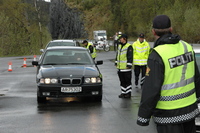 The risk of apprehension for traffic law violations refers to the probability that a traffic law violation is detected and sanctioned by an enforcing body. Road traffic law enforcement in Norway is performed by the police and – for some minor violations – the Public Roads Administration. The risk of apprehension is stated in terms of the number of violations detected per million kilometres of illegal driving, i.e. per million kilometres driven while committing a certain offense.
The risk of apprehension for traffic law violations refers to the probability that a traffic law violation is detected and sanctioned by an enforcing body. Road traffic law enforcement in Norway is performed by the police and – for some minor violations – the Public Roads Administration. The risk of apprehension is stated in terms of the number of violations detected per million kilometres of illegal driving, i.e. per million kilometres driven while committing a certain offense.
The risk of apprehension is highest for drinking and driving (32 instances detected per million kilometres of driving with an illegal blood alcohol level). The risk of apprehension for speeding, not wearing seat belts and using a mobile phone is about 12-14 detected instances per million kilometres of driving while committing the violation concerned.
The risk of apprehension is lowest for driving when impaired by drugs and violating hours of service and rest (less than 5 detected instances per million kilometres of illegal driving).
The contribution to traffic injury of 15 different traffic law violations has been estimated. Estimates suggest that if these violations were eliminated, the number of road accident fatalities could be reduced by about 50 % and the number of injured road users reduced by about 30 %. There is, in other words, a large potential for improving road safety by eliminating traffic law violations.
The three violations that make the largest contributions to the number of fatalities are speeding (close to 23 %), drinking and driving (close to 17 %), and not wearing seat belts (13 %).
Figure 1 shows the relationship between the fatality risk attributable to various traffic offences (stated as a proportion) and the risk of apprehension when committing these offences.
The risk of apprehension when speeding is comparatively low in view of the rather large contribution speeding makes to traffic fatalities.

Figure.1: Relationship between fatality risk attributable to various offences and the risk of apprehension for the same offences





